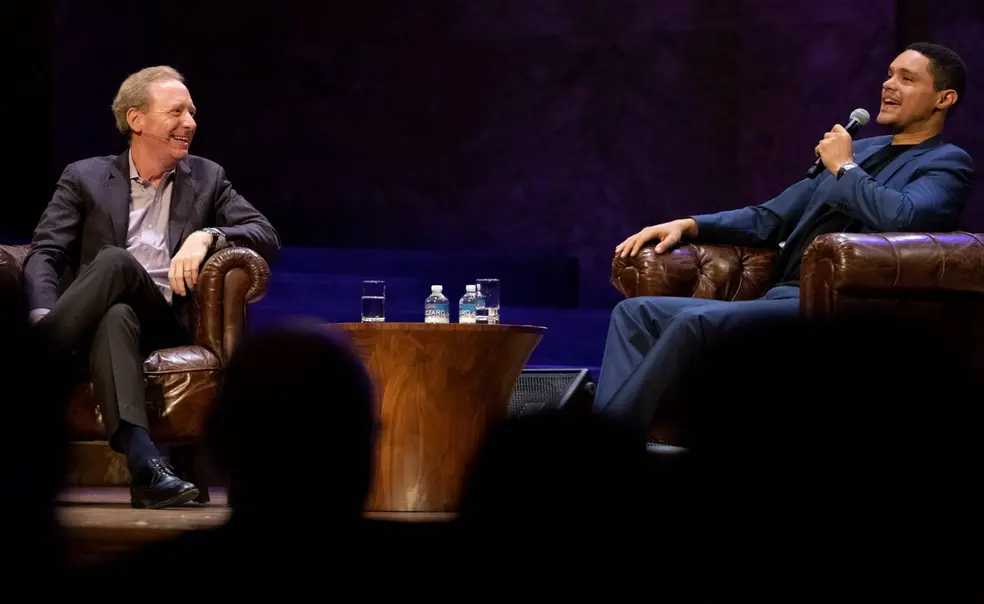Microsoft’s Smith ’81, Daily Show’s Noah Discuss Technology at Princeton Event
Microsoft president Brad Smith ’81 recalls how his Princeton class — one of the last before students started using computers — had to produce their senior theses the long way: first on paper, then transcribed on typewriters.
“In my day, a large percentage of senior theses were written in the last week before they were due,” he admitted to a full house in Richardson Auditorium Sept. 27, much to the amusement of the audience. In the days leading up to the senior-thesis deadline of his then girlfriend (and now wife), Smith would trek across campus to help her type up her final chapter. “When this thing comes out,” he said, referring to computers, “I don’t have to type for her anymore — and I’m like, this is great!”
Computers — and technology at large — were a point of mutual interest for both Brad Smith and South African comedian Trevor Noah, who joined Smith on stage in Princeton for the first time. (“We love you Trevor!” some students yelled as the two men entered the room; “Go Brad!” yelled others.)
Noah, who hosts The Daily Show, said he owes much of his success to technology. As one of the first comedians in South Africa to put his comedy online, he told the audience that technology is necessary “to further your goals, to further yourself.”
“I think we live in a world now where if you don’t know how to use a computer, you’re basically being doomed to a life of poverty,” he said. Noah was first exposed to computers by his mother, he said, who brought one home from her work as a secretary when he was a child.
For Smith, imbuing a sense of humanity in technology is an equally pressing priority. “When you think about artificial intelligence, what we’re really doing is giving machines the ability to make decisions that have always been made by people,” said Smith. A graduate of the Woodrow Wilson School, he believes that collaboration among people of different disciplines can help with the challenge. “You would want [machines] to be imbued with the best of the humanities, the social sciences. More than anything, people need to talk each other’s language.”
Noah stressed that to achieve this goal would require more diversity in the workforce, which to him is a simple process: “just do it,” he said. “When people ask how do you make places more diverse, you just do it. You give people chances.”
Members of the audience were eager to ask questions once the opportunity arose. One student asked about how to prevent misinformation in the digital age, while another asked about how Microsoft is combating racial biases in artificial intelligence.
Despite the challenges that come with mass digitization, Noah said he is optimistic about the future of technology. “Technology is something that has connected us with information that informs us of other people doing other things,” he said. “Painful things, happy things, powerful things, and sometimes just cats playing pianos. But I’m totally optimistic because I genuinely do think that, as humans, we strive to that place of being connected.”
And connected they were with the audience that evening, who shouted and clapped at various points throughout the talk. In one example of technology bringing people together, a nonstudent who had driven two hours to see the two men was able to grab a selfie with Noah and Smith after his turn asking a question during the Q&A.
“That was nicely done,” Noah remarked. Laughter filled the auditorium, followed by cheers.










No responses yet